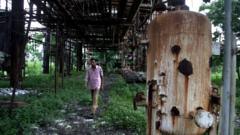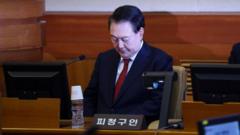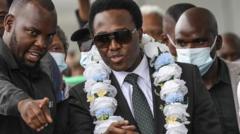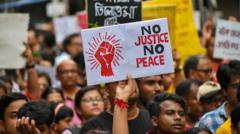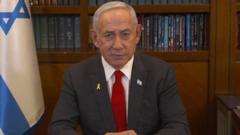In response to widespread protests and public unrest, Serbian Prime Minister Milos Vucevic has resigned. This strategic move by President Aleksandar Vucic aims to ease tensions amidst escalating demonstrations fueled by recent tragedies related to government failures.
Serbian Prime Minister Resigns Amid Ongoing Protests Challenging Vucic's Rule

Serbian Prime Minister Resigns Amid Ongoing Protests Challenging Vucic's Rule
President Aleksandar Vucic's attempt to quell protests leads to the resignation of Prime Minister Milos Vucevic, raising questions about the stability of his governance.
Article Text:
Serbia is witnessing a wave of protests that have put President Aleksandar Vucic's decade-long rule to the test. Amid this unrest, Prime Minister Milos Vucevic announced his resignation on Tuesday during a press conference in Belgrade, marking a significant political shake-up in the government.
The protests have drawn considerable public attention, particularly following the tragic collapse of a canopy at the recently renovated Novi Sad railway station, which resulted in 15 fatalities last November. In a bid to address mounting frustrations, Vucevic stated he is stepping down to avoid further exacerbating societal tensions, a decision that came shortly after President Vucic called for a significant reshuffle within the government.
Throughout his tenure, President Vucic has displayed a skillful maneuvering within Serbia's polarized political landscape, often sacrificing allies to maintain control or to leave opposition parties reeling. Despite the opposition's relative success in tapping into public discontent through protests, they have struggled to pose a serious electoral challenge against Vucic.
The resignation of Prime Minister Vucevic is uncertain in its effects on the protests. While some believe it could calm the unrest, others fear it might incite further demonstrations. Student-led protests have been particularly vocal, with barricades set up on campuses and gatherings outside the ruling party headquarters. Unidentified assailants have reportedly clashed with protesters in the city of Novi Sad, intensifying the conflict.
Vucic has pledged to address one of the key demands of the student protesters by releasing documents related to the reconstruction project linked to the tragic railway station collapse, which was overseen by a Chinese company and local subcontractors. As Serbia navigates through this political turmoil, the next steps from its leadership—and the response from the public—remain to be seen.
Serbia is witnessing a wave of protests that have put President Aleksandar Vucic's decade-long rule to the test. Amid this unrest, Prime Minister Milos Vucevic announced his resignation on Tuesday during a press conference in Belgrade, marking a significant political shake-up in the government.
The protests have drawn considerable public attention, particularly following the tragic collapse of a canopy at the recently renovated Novi Sad railway station, which resulted in 15 fatalities last November. In a bid to address mounting frustrations, Vucevic stated he is stepping down to avoid further exacerbating societal tensions, a decision that came shortly after President Vucic called for a significant reshuffle within the government.
Throughout his tenure, President Vucic has displayed a skillful maneuvering within Serbia's polarized political landscape, often sacrificing allies to maintain control or to leave opposition parties reeling. Despite the opposition's relative success in tapping into public discontent through protests, they have struggled to pose a serious electoral challenge against Vucic.
The resignation of Prime Minister Vucevic is uncertain in its effects on the protests. While some believe it could calm the unrest, others fear it might incite further demonstrations. Student-led protests have been particularly vocal, with barricades set up on campuses and gatherings outside the ruling party headquarters. Unidentified assailants have reportedly clashed with protesters in the city of Novi Sad, intensifying the conflict.
Vucic has pledged to address one of the key demands of the student protesters by releasing documents related to the reconstruction project linked to the tragic railway station collapse, which was overseen by a Chinese company and local subcontractors. As Serbia navigates through this political turmoil, the next steps from its leadership—and the response from the public—remain to be seen.











